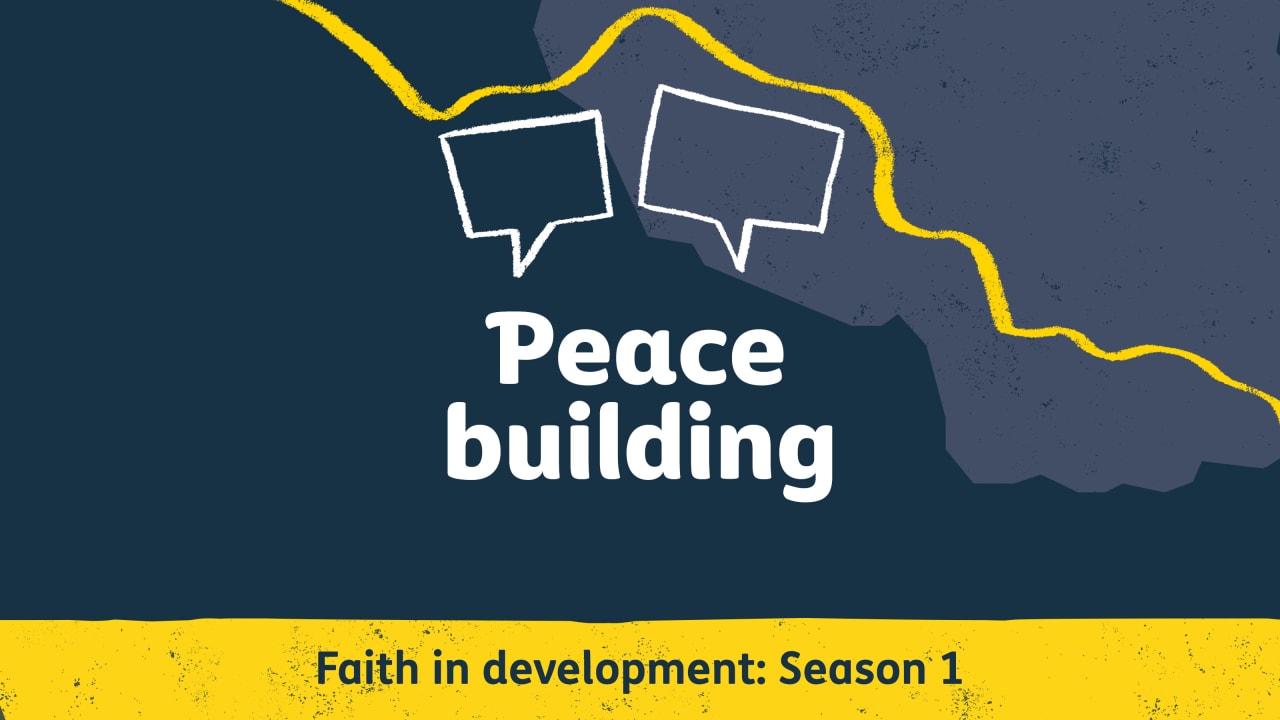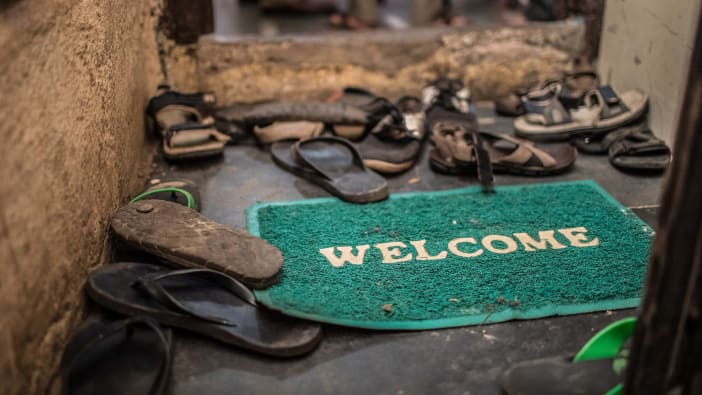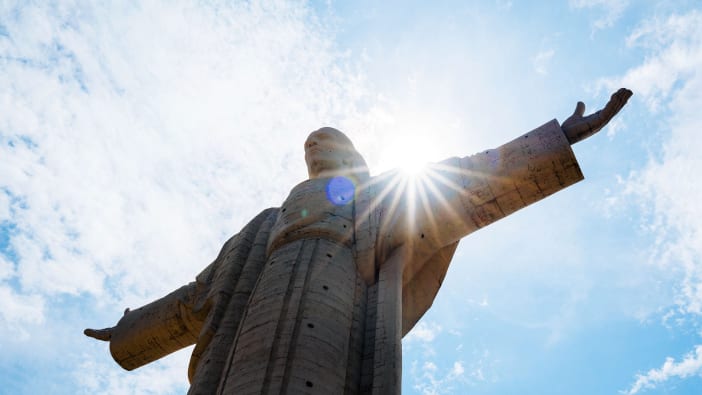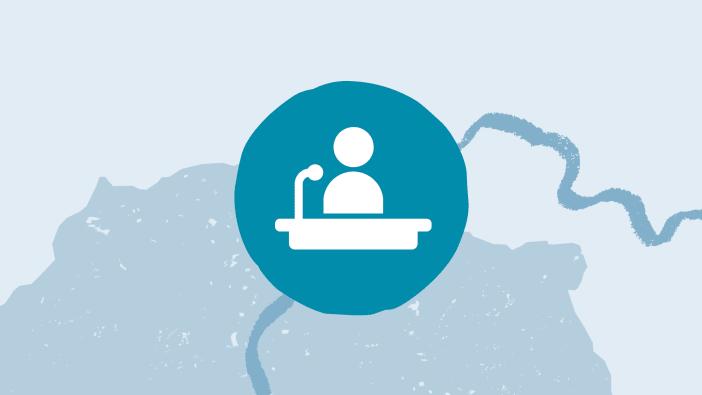Mariam Tadros 0:45
Yeah, sure. Thanks, Alice. So, within our peacebuilding work, we worked within the first year to come up with this kind of theological framework that underpins our peacebuilding work. Part of that was looking at what some of the key concepts, key elements, of what it is to do peace building, but mostly to be a peacebuilder, in conflict areas. It's really built into a verse that comes from the book of Romans in the New Testament, that talks about how the whole of creation has been groaning in labour pains until now. It's this idea that as humanity, we are consistently in this process of transformation, and in this process of complexity, and becoming more and more who we are created to be. From that, there's a famous peacebuilding theologian who kind of is the peacebuilding theologian to go to called John Paul Lederach. He talks about this concept of the moral imagination, which is this space within a peacebuilder, within those who want to work in peacebuilding that allows you, in the midst of complexity and in the midst of conflict, to imagine something different. He talks about four key elements that make it possible to do this: 1) the ability to imagine ourselves in a web of relationships, and relationships that include our enemies, 2) the ability to sustain a curiosity about the world that makes it complex and doesn't rely on journalism, 2) the ability to believe in and pursue the creative act to create new things and 3) the willingness to accept the inherent risk of stepping into the mystery of the unknown. That is beyond what might surround us at the moment.
Alice Philip 2:33
David, are there any particular elements of that, unpacking those four elements, that have particularly struck you within the moral imagination?
David Couzens 2:42
I think there's a couple of bits that always strike me about it. The first is that sort of web of relationships. Part of that is about engaging with people that are different, who hold different points of view. But so often, when we do that, we engage with a view to try and persuade them to change their point of view. This is very much coming at it from the perspective of engaging with them to learn, to understand, to be open to, to growing, our view of what it is, what that relationship is, and where people are coming from. So, not going in with a set mindset. That is one element of it. I think the other bit is about embracing complexity. So often, as we try to understand things, we simplify and as we simplify, it becomes sort of either or, you're this or you're that. We attach labels and that ends up dividing. John Paul Lederach recognises very helpfully that people are complicated and complex, and we often hold points of view within ourselves that are in tension, and therefore it's avoiding that oversimplification. It's recognising that complexity, and being able to sit in that complexity. And I think the last bit as well about being willing to take a risk. So often we feel we've got to try and plot out every step of the way. I remember listening to a lady called Danielle Strickland once who worked for The Salvation Army. She talked about a visit to Mount Sinai and doing a pilgrimage there and as part of that walking up the mountain in the dark, with the aim of getting to the top in order to see the dawn. She makes the point that you couldn't see the top, you couldn't see the whole route, all you could see was enough to take the next couple of steps. It's having that confidence that you're heading in a direction and that enough of the route will be revealed as you go along in order to get to the top, but you need to step out and just take those first steps. And I think that's quite helpful in terms of thinking about risks as well.
Alice Philip 4:52
There's something very emergent about this approach. Mariam, is there anything that you'd like to add to what David said?
Mariam Tadros 5:00
Maybe, just to pick up on the other element, which is the creative element. Creativity isn't a simple thing. But actually, it takes hard work. It takes hard graft. And it takes a real, going back to that idea of complexity, it takes a real commitment to understanding the different power dynamics, to understanding what it takes to bring people, including your enemies, along on that journey. And then the bravery, really the courage to attempt to offer a new vision with people who may well be stuck within their norm. That risk and that creativity, there's a deep beauty in it. It is emergent, but there is deep danger in it as well. The commitment to the hard graft of actually bringing something to life.
David Couzens 5:52
Jean Paul Lederach has another phrase that he uses that I've always quite liked. And he talks about the gift of pessimism. What he's getting at there is the grounded reality that people living in conflict have. They know that peace is difficult, they are weary, they've seen too many bright ideas come and go and fail and often make situations worse. And so, they have this sort of pessimism that is wary of simplistic solutions that promise much but fail to deliver. I think that he calls it a gift because I think it is that reality that comes in and tests your ideas and keeps you true.
Alice Philip 6:39
Thank you for that. We're going to hear now from Kieran Barnes, who will be reflecting on Tearfund's work in the Middle East where he was director.
Kieran Barnes 6:51
I recently went to a village in Iraq, where I met a group of young men who were going on one of our courses, which is about helping them process some of the trauma and experiences that they've had over the last few years during the conflict there. I was sitting in the discussion as they're talking about the impact it has on their lives, their personal lives, but also their education, their future, what are their hopes, what are their fears. Part of that course is helping them move forward from this, moving beyond the crisis and looking for hope for the future and what comes next. What was really interesting about that experience recently, was I was there three years ago, in the same part of Iraq, right where ISIS were up at the frontline where the conflict was going on. All those villages have been abandoned. Buildings have been destroyed, there was no life, they were like ghost towns. So three years later, now coming back and seeing these villages populated again, with families, kids playing in the streets, and communities starting to come back to life, starting to feel safe again, and actually starting to think about the future and the hope moving forward. I think for a lot of young people who've grown up in this region within these contexts, they've experienced maybe a short part of their life with a bit of stability in a normal life as we would think of it. But from that early age, they've then had to flee and go somewhere else and follow their family having no idea what's going on. So their formative years, when they're getting into the double digits into their teenage years, they've not grown up with a normal home, they keep potentially moving. They're not sure what's coming next, it's very much about the day-to-day about survival. Getting one day to the next there's not that chance to think about what do I want to do when I grow up, or those kinds of dreams that we all have on where we're children. They're simply thinking about the next day. We as an organization want to help them process through that and start to bring that hope back into their lives so they can start dreaming about the future and start thinking about the long term. Few years ago, I was down near the frontlines where people were fleeing from ISIS in Iraq. And I met villagers who are crossing the frontlines from one side of the war into another side of the war. These are people who were coming through on trucks, there were many men on one side and women and children were on the other. I saw the women and children coming off the trucks literally with all they had, all they were wearing. And then they were going through a kind of process and what then happens to them, taken off to camps where they were provided with shelter and accommodation, these kinds of things. Talking to those communities a few weeks later about the experience that they've gone through, the challenge of just leaving their home, fleeing, having to go through areas that have been destroyed, having to negotiate their way out safely, but also avoiding things like sniper fire, seeing the bodies in the roads and their whole families just kind of walking through these areas. That was very challenging to think about, that experience that they've gone through. But then also this difficult experience of living within very hot conditions. And again, not knowing what the future holds or what's going to happen to them next. We've heard lots of stories in the region of people fleeing and I think that is sometimes the hardest thing to hear, the trauma that they've gone through. We know that there are families who have died in the mountains, for example, between Syria and Lebanon, who have frozen to death in the winter. That's the fear that people have had that have driven them to take these risks, to escape what they've been experiencing. And that's a very difficult thing to hear. But knowing that we can now help those who have made it out, providing them with support is so crucial. I think the young people within these colleges are so crucial for the future of these contexts and the future for peace and hope within the countries and as an organization, we really want to focus on them. As a group, they're a vulnerable group. But they also provide or show a lot of potential for the future. They've gone through difficult experiences, but as we help them process through that trauma, but then also start to think about where does conflict come from? Where's the anger that comes from within communities, within cultures, within the power dynamics and the politics? Helping young people to open their minds to see other sides, how their experiences are helping them, looking at where that comes from. If they can address that, then they're the ones who are going to change the future. They're the ones who are going to be more open to their neighbours, who are going to be more open to the countries around them, and hopefully bring that long-lasting change the way we really need it. I think the young people within this region are particularly vulnerable group, they've gone through a lot of trauma and challenges themselves at a young age and they're potentially looking at a future where they, they're uncertain, they don't know what's gonna come next. If we're not able to work with this group, and help support them or process that and help bring hope, then we're going to end up in a cycle of going through the same conflicts and the same crisis over and over again. They are the future that could change things for the better. Or, we could continue to be repeating the same crisis again, again and again.
Alice Philip 11:51
It's been great to unpack the concept of moral imagination, and to hear from Kieran. Mariam, David, we'd love to hear from you about where you've seen moral imagination coming to life, grounded in a story from your work. So Mariam, maybe you'd like to go first.
Mariam Tadros 12:10
So the biggest story that's coming to mind, for me is some of the work that we've been doing for the last three and a bit years now, particularly in the Kurdish region of Iraq and in Iraq. And the story for me, that highlights the moral imagination is how the work there began. We have a community of 12 peace builders who come from different backgrounds, different religious backgrounds, different ethnic backgrounds. When we first started out together, there were five peacebuilders. They didn't really know each other, they had kind of heard of each other in different circles as you do within the sector. But they weren't friends, they didn't really interact in their lives. And I remember, one of the first times we came together, we did a workshop around healing the wounds of war. It was an opportunity for each of them to spend five days together all of us in a room, and really kind of go into this space of discovering their own stories as individuals who had lived some of them through three or four civil wars, through invasions through genocide. We have people from Christian backgrounds, IDI, backgrounds, Sunni and Shia backgrounds. And people who had, through their own families, just through their own experiences have not only seen conflict, but lived that life of displacement, of just trying to get by. And I remember being in that workshop, and being so blown away by when we started to unpack what those wounds of war were, how day to day they were. So for people it was their children not being able to go to school or the fights that they had at home or their family issues that were going on, or in the context of the wider conflicts that they'd lived and experienced. And a lot of their hope, and a lot of their imagination was purely about wanting to build a peaceful future where their children, their families could do the normal things that families do. And what was even more incredible was that they were willing in this space with people who on a state level, if you like, should have been enemies. They were willing to share their heart, to share their own journeys, to share their own stories. And I think for me, what came out of that time together was firstly, that binding of relationship, that network building that John Paul Lederach talks about. Then, we went through a creative process of imagining 'Okay, in your spaces, what could actually be possible to be done within your community?' That could begin to build some peace. Once they were given that freedom to share their own stories, recognise their own wounds, and then to begin to imagine what better could look like, what came out was incredible. That's been the work that we've been doing for the last three years together, that network has grown. It's young people, it's older people, it's men and women. You know, it's small. It's small projects, small initiatives. But for me to see the friendships that have grown amongst them, for me, it was ultimately the ability within that setting and that context to imagine having friendships with your so-called enemy. It was something I don't think many could imagine often. That then led to the creative act of being able to actually do something together. So for me, that group of people are incredibly special. It's an absolute privilege really, to watch that process of imagination lead into creative acts.
Mariam Tadros 12:10
I was struck by how you talked about those people being special, and also that they were willing. Have you got any reflections on what made those people willing to make that imaginative leap to enter into that moral imagination of something better, something different?
Mariam Tadros 16:32
I think for me, there are two things. One, which is a fundamental belief that each human being is made with the ability to create and is made in the image of a God, Creator God. Instinctively, and each one of us has that ability to imagine and then to create. I think the second part for me is, what I've noticed from Iraq and other places, is once you open up space where people feel safe, and they feel able to say the things that they imagine and dream, without feeling like they're just going to face disappointment. The things that come out are utterly incredible. Allowing space for people to envision and dream and come up with ideas, and essentially name their hopes, which is a really scary thing when you're in a country that often your hopes get dashed, either because of war or because of external influence. The space to allow that to come out, and then obviously investing in making those things come to life.
Alice Philip 17:32
Thanks. David, what story would you like to share with us today?
David Couzens 17:38
I think as I reflect on that comes to mind a group of peacebuilders from the Great Lakes region in Africa. And this is a group of seven or eight people who have known each other for many years, they've met together for many years. And they're all from different countries and their countries that have had a difficult relationship with each other, they've each hosted refugees from each other's countries. And at the same time, they've each hosted armed militias from each other's countries. And so there are tensions between the countries, there's a high level of distrust. And yet this group of people are determined to model a different way of being to model away of trust, and relationships. And I was fortunate to be part of some of their workshops where they came together. And you can see there's a tremendous strength of relationship between them. And a lot of them work with young people. They work in developing young leaders, next generation leaders. And one of them expressed it to me that they want to bring these young leaders from different countries together, so that the next time looking to the future, there's tension between their countries. And when politicians when leaders from those countries come together and sit together to try and resolve it, that the two people sitting there are graduates of their program, they've grown up knowing each other, they've come to the same events, and therefore they relate to each other, not as opponents, but as peers looking for a solution. And a very real example of that, that while we were at that workshop, one of the younger members of the group had been to get a visa for travelling somewhere. And he was coming back on the back of a Boda-boda motorcycle, and he had his bag snatched, and in his bag was his laptop. And so he lost his laptop, and they're not well off, and yet there and then that group of people recognize that he needed a laptop. And so they just had a whip round amongst themselves and there and then they managed to pull together enough money for him to go and buy a new laptop or a second hand laptop to replace that. And it just struck me there's that sacrificial nature of that relationship. And that ability to imagine that future where people leaders from their countries could come together as friends. And to resolve a problem, a shared problem together,
Alice Philip 20:04
You described a roomful of people seeking solutions and building relationship. For those of us who haven't had the privilege of being in one of those rooms of that group of people, can you just explain to us a bit of what that might sound like, look like, feel like?
David Couzens 20:21
For that particular meeting - and we were just together as it was a long weekend - one of the things they were trying to do was to understand what was causing that tension, and to understand it from the perspective of each other's countries. So rather than just looking at it as a group of people from Rwanda, what does that look like? If you're from DRC? What does that look like if you're from Burundi, so really trying to get an understanding of how it's perceived from the different perspectives? So that's really getting at understanding that complexity. But they're also looking at practical things like 'how do you achieve influence?' 'How can you do advocacy with people?' 'How can you lobby for changes in policy?' 'How do you organize to do that?' And in particular, how can you use the strengths of each other? So, rather than a Rwandan trying to talk to somebody, a politician from DRC, how can you use people from within DRC to do that and to represent the views of Rwanda and or the perceptions of that? So how can you lobby for each other in each other's countries, so you're lobbying more as sort of trusted insiders, but with a particular insight that you can bring into that debate?
Alice Philip 21:28
That's really helpful to have it grounded in the room. Before we finish, I'd love to take us back to that term moral imagination. And I was wondering, Mariam, if you could unpack for us? What is moral about the imagination. I'm sure that people have debated this a lot and not looking for the definitive word, but just explain to us a little bit about what makes it moral.
Mariam Tadros 21:53
John Paul Lederach talks about morality, not in the traditional sense of morality being doing right or wrong, but he talks about it being values based. It's an imagination that's grounded in values of the other things that we'll be talking about at some point of hospitality, values of respect for the other, values of seeing that each one of us is made in the image of God, that it's an ability to imagine from that space of being a creative being, essentially. So, it's very much trying to tap into the imagination that might not necessarily just be in our heads from knowledge, but the imagination that really comes from the heart of lived experience, essentially. That would be my understanding of that particular element of it.
Alice Philip 22:48
Fantastic. Well, it's been fascinating as ever. For listeners who haven't heard our first program, please go back to episode one. We're looking forward to you joining us in the future for episodes on embrace and hospitality. So, thank you very much to Mariam. Thank you to David. See you all next time.










